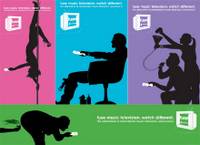
Big media outlets are getting their word in now on the
JibJab video situation. Here's a solid
WIRED story, a piece in
Reason.com (that links me), and a short piece in
Newsday.
We already knew that the JibJab guys had
contacted the EFF for help in the matter after receiving a cease & desist letter (C&D)
[C&D - PDF] from the copyright owners in the original Woody Guthrie song "This Land is our Land." Now the EFF has gone a step further by sending out a response
[EFF response - PDF] discussing why they think the JibJab video is a parody. The discussions in both letters are informative as to the law of parody, they're only 4 pages each.
I must say, even though several commentators have agreed with me that the JibJab video is a satire, including
Lawrence Lessig, I am having doubts about my original position based on the history of the song that interested bloggers and commentors have turned up. I don't know if I'm ready to be labeled a total "flip-flopper" yet, but my thoughts on the parodic nature of the video have shifted based on all the new information that's been dug up.
As I have noted
several times in the past, a work that contains both elements of satire and parody should still be considered a parody. Therefore, if the Jib Jab video is a
satirical look at the current presidential election between Bush and Kerry, but also a
parody of the meaning of Guthrie's song, then the presentation as a whole should be protected under the fair use doctrine of the copyright law and the
Campbell v. Acuff-Rose case.
Here's my beef with the parody argument though: it reeks of post hoc reasoning (after the fact) that I am inclined to think is a little over the top. What I mean is that I seriously doubt the JibJab guys were sitting around thinking this as they authored their video (excerpt taken from the EFF letter):
"While [the copyright owner's] view of Guthrie's "This Land is Your Land" [is] predominantly about "the beauty of the American landscape" and "the disenfranchisement of the underclass" ... most Americans think of the song as an iconic expression of the ideal of national unity. [Our] parody addresses, among other things, the lack of national unity that characterizes our current political climate ([and ends] with the optimistic hope that unity might be rediscovered)."
In the comments on
this post Ernest Miller suggests it does not matter what the artist was thinking and that the complicated reasons why artists do what they do is not an issue in a parody finding. I agree with him to some extent and so does the US Supreme Court, just look at the
Acuff-Rose case. I seriously doubt that 2 Live Crew was thinking along the lines described in the
Campbell v. Acuff-Rose opinion when they wrote "Pretty Woman." The Supreme Court in
Campbell v. Acuff-Rose states:
"2 Live Crew juxtaposes the romantic musings of a man whose fantasy comes true with degrading taunts, a bawdy demand for sex, and a sigh of relief from paternal responsibility. The later words can be taken as a comment on the naivete of the original of an earlier day, as a rejection of its sentiment that ignores the ugliness of street life and the debasement that it signifies."
This paragraph as written by the Sup. Ct. is more lyrical than the song it describes, I don't think the members of 2 Live Crew are capable of such thought (and believe it or not I have met them, my opinion is based on personal experience). It is apparent that post hoc reasoning is acceptable and even necessary in these cases since artists do not record their thoughts as they work. But post hoc reasoning still sounds suspicious to some people (or courts).
Ultimately, because of my own suspicions about the post hoc reasoning I am left wondering if the JibJab guys actually used "This Land is our Land" because of it's history and meaning or just because it is a familiar tune with a refrain that worked well for their video...period.
To suggests the work is a parody one must take the position that the Jib Jab team knew the history and meaning of the song when making their video, even if that knowledge was some sort of background psychology at work in their heads at the time. The truth is that at this point it no longer matters because we can never know what they were thinking when making the video and therefore must assume for them a legal 'best-case scenario.'
The four factor parody inquiry is essentially an objective one because it utilizes this post hoc reasoning - the best stuff your attorney can come up with after the fact. But actually this appears to be an attempt to get at a very subjective question: just what was the author thinking when doing the work, even if the thoughts were in the background or subconscious. In the end what the author was thinking really can be irrelevant to the the legal finding.
In light of the newly dug up information on the history of the song and because the parody inquiry requires objective post hoc reasoning as to the authors intent in creating the work, I believe I have to change my opinion on the matter and give the JibJab guys the benefit of the doubt in this case and assume that they made the video with parody 'in mind' (even if in some deep recess of their mind). I still maintain my doubt as to their subjective intent in making the video, they may well have chosen "This Land is My Land" merely because it had a familiar tune and a convenient refrain.
Anyone have an opinion on this discussion?
[Note: My
original post on this matter, linked to on
Slashdot and
The Importance of... among others, is
here.]




























 <
?
law blogs
#
>
<
?
law blogs
#
>
